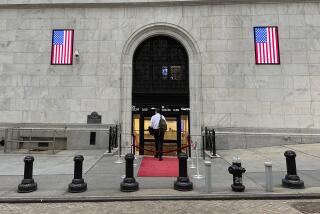NEWS ANALYSIS : U.S., Japan Swap Insults Before Chip Talks Open : Trade: Japanese computer companies accuse American semiconductor suppliers of failing to honor their contracts.
- Share via
TOKYO — A meeting between American and Japanese trade officials scheduled for this week to review Japan’s compliance with an agreement to buy more semiconductors from U.S. and other foreign suppliers is shaping up to be a contentious affair.
Both sides fired salvos last week, blaming the other for stalling progress on increasing the foreign share of Japan’s semiconductor market.
American trade officials were expected to come down hard on their Japanese counterparts at the talks beginning Thursday in Hawaii, but some members of Japan’s electronics industry struck first last week. They charged that American chip makers are partly responsible for not meeting market share goals outlined in the 1991 agreement because they failed to deliver millions of dollars in orders placed by Japanese customers last year. Further, they allege, the unfilled orders have resulted in millions of dollars in losses for Japanese companies.
The Japanese charge that orders from Japanese customers were diverted to U.S. customers because a boom in the U.S. personal computer market has resulted in a flood of orders for a limited supply of semiconductors.
“There have been many cases of cancellations, reductions and delays in deliveries from big American chip makers since demand picked up in America,” says Tamotsu Harada, spokesman for the Electronic Industries Assn. of Japan, an industry group. “When you can’t even fill your orders, is it fair to stand up and complain about Japan not buying enough?”
American industry officials dismiss the charges. “This sounds like a panic move on the eve of the talks,” says Roger Mathus, executive director of the U.S. Semiconductor Industry Assn.’s Tokyo office. “There are always shortfalls in some product areas. I could come up with a list of Japanese companies that aren’t filling American orders for products.”
U. S. Trade Representative Mickey Kantor in Washington on Friday also challenged the Japanese assertions and indicated that the United States would not retreat from the market share goal.
At stake in this squabble is the fate of a semiconductor agreement that has come to symbolize the troubled state of high-tech trade between Japan and the United States.
After years of American complaints that the U.S. share of the Japanese market was abnormally low when compared to its share in Europe and elsewhere--a difference U.S. executives attributed to market barriers in Japan--Japan agreed as part of a 1986 semiconductor agreement to raise the foreign share of its market to 20% by 1991. In 1991, the agreement was revised and the deadline for the 20% market share goal extended to December, 1992.
When the market share numbers for the final quarter of 1992 are announced later this month, they will likely reveal that foreign share of the Japanese market remains just over 17%.
Japanese officials believe that’s pretty good, considering foreign share of the market was just over 8% in 1986. And they point out that the language in the 1991 semiconductor agreement refers only to a U.S. “expectation” of a 20% market share and that Japan never promised it would fulfill that expectation.
The American side looks at things differently. The U.S. Semiconductor Industry Assn. warned earlier this month that if Japan failed to reach the 20% market share number it would “work closely with the Clinton Administration and Congress to seek redress and pursue appropriate measures to ensure compliance.” In other words, threatening U.S. retaliation.
For the Clinton Administration, the growing rancor could prove an important test of how far it can go in its efforts to pry open foreign markets before resorting to retaliatory measures that could label the Administration as protectionist.
“The semiconductor agreement has become a proxy for technology agreements,” says a senior executive of an American chip maker. “They (the Clinton Administration) have to make it work.”
The Japanese feel betrayed by the angry tone of American rhetoric at a time when technology development and licensing agreements are being signed by companies of the two nations in growing numbers and the government has launched a major effort to persuade Japanese companies to use more U.S. chips. “What can we do, we can’t force our companies to use American chips,” says a Ministry of International Trade and Industry official.
But the most potentially damning Japanese charge is that American companies may be giving priority to U.S. customers over Japanese customers.
Major American chip makers deny that they have canceled orders or given priority to American customers. “It costs a lot of money to be a serious player in the Japanese market,” says Norman Neureiter, director at Texas Instruments’ Asia division. “You can’t be serious about this market and not be sure customers are getting a fair shake.”
Nevertheless, American executives concede that there is internal pressure to sell chips in America, where prices are temporarily higher than in Japan.






